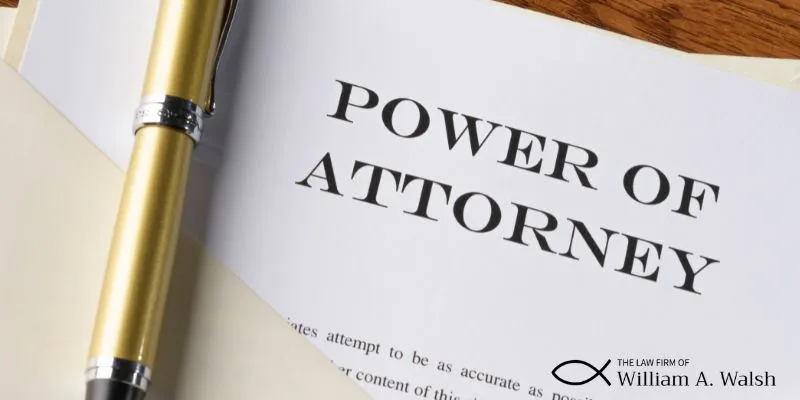Many older Texans are deeply concerned about their loved ones and want to ensure that their legacy is passed down long after they are deceased. They also want to be sure that their interests and the interests of their family will be protected, even if they are no longer able to make decisions regarding their own health and assets. In such cases, Texans will opt to draft and issue a power of attorney to safeguard their own well-being.
In estate planning, a power of attorney document is a powerful tool that can be used to protect the assets and health of an individual. At The Law Firm of William A. Walsh, we are well-versed in Texas elder law and the associated legal procedures for issuing and enforcing a power of attorney document. At our firm, we are dedicated to ensuring that your estate, and the well-being of you and your family, are protected long after you are unable to make decisions or have passed on.

A power of attorney, or POA, is a document that hands over permission for an individual, known as the agent, to take certain decisions or carry out certain actions on your behalf. The individual who is authorizing the agent to make decisions and take action for them is known as the principal.
The principal must be at least 18 years of age and be of “sound mind,” meaning that they are still fully capable of making rational decisions for themselves. A Texas lawyer can arrange the drafting of the document and ensure that it can function according to your wishes.
To officiate the document, the signatures of both the agent and principal must be notarized or signed with witnesses present, depending on the type of POA. It’s important to make copies of the POA document and give them to the appropriate relevant parties. Once it has gone into effect, you should review the terms and conditions at least once every three to five years.
There are different kinds of POA that are legal in Texas, and their function varies based on the actions that the principal wants to be carried out for them as well as whether they are still capable of making decisions for themselves or not.
The two main classifications of the POA include a medical POA and a statutory POA. In a medical POA, an agent is able to make decisions regarding the health of the principal on their behalf. This can govern decisions related to:
The statutory POA gives the agent power to make decisions for the principal regarding issues related to their assets and other property. Based on the specific POA issued, this can mean that the agent can, under the name of the principal:
Whether you need a medical or statutory POA depends on what kinds of decisions or actions you would prefer your agent to do for you.
A POA can be further classified based on when the document is to go into effect and whether the principal is still capable of making decisions or not. The following major subcategories of POA documents in Texas are:
If you are looking to draft specific documents as a part of your Texas estate planning process, it can be useful to work with a trusted Texas estate planning lawyer. They can help ensure that the wording in your documents can carry out your wishes and that the terms of the powers granted are viable under Texas law.
If you have issued and signed a POA, it is your right under Texas law to revoke it at any time. Although you can revoke it by simply destroying the original document, it is advisable to draft an official document, stating that you have revoked the POA. You should then send a copy of this new document to all interested parties.
When issuing your power of attorney document, you want to make sure that you word it right the first time. Small mistakes can lead to issues arising after the document goes into effect, which could have a huge impact on your health and your assets. At The Law Firm of William A. Walsh, we have years of experience helping Texans plan for their future and their legacy by helping issue power of attorney documents.
In addition to a POA, our legal team can assist you with all your estate planning needs, including avoiding or navigating probate, setting up trusts, and more. Get in touch with our office today for help setting up a POA.